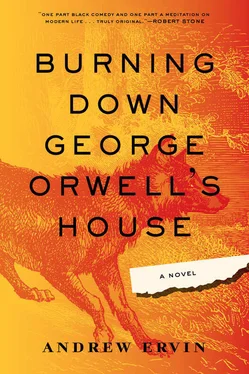His boss Theodore “Bud” Jackson was one of six executive vice presidents. Ray had gone out drinking with him a few times at a dive where a former Miss Ukraine tended bar. They watched her wash beer glasses for hours and that was far more entertaining than another stupid ballgame on TV. Bud’s career had been a tumultuous one. He had started out as a specialist on mail-order marketing and on his way up the corporate scaffold impregnated an entry-level data enterer who returned to her native Korea. Once a year she mailed him a portrait of his daughter, who he had never met in person. She had to be nine or ten already.
The US consumer market’s evolution from analog to digital technologies had required Bud, like everyone else, to diversify his skill set. By age forty, he had become an early adopter of every new technology and helped Logos transition from a traditional ad house into a “creative communications company.” Under Bud’s watch, advertising had become a bad word. Logos didn’t have clients, it established strategic partnerships; it didn’t make commercials, it created market-driven branding solutions. It was all very Orwellian — he and Ray thought a lot alike. Along the way, Bud also transformed himself into the industry’s foremost snack-food guru. Every obese child in America who reached for a second fistful of chips did so in large part because of Bud’s tireless efforts. He was losing a loud argument with the operating system of his computer when Ray poked his head in.
Ray’s probationary internship period had apparently come to an end. Bud offered him a permanent and full time position, which he accepted without negotiation. The salary was an abstraction. At twenty-four years old he would make more money than his father did down at the plant — and without the daily exposure to known carcinogens. That afternoon, he moved from his cubicle into a slightly larger one.
The work turned out to be far less exciting than he had envisioned. He spent months at a time rewriting the same two or three concepts for the same two or three small partners. A half-trained monkey could have done his job, but he kept his head down and churned out copy. Sometimes after work he would hit the bars with some coworkers or go on the occasional date and bring a girl home to make sweat angels in the bed sheets.
To keep himself intellectually stimulated at work, Ray taught himself new graphic design and web development languages. He played with open-source CGI programs like they were real-time strategy video games; from his cubicle, after hours, he built parody sites for real companies that were more effective and easier to use than their official sites. After that, he created a Big Brotheresque widget that could scan ten thousand status updates — chosen according to specific user demographics — and aggregate their keywords into a randomly generated ad for a product that did not exist, but which 0.78 percent of those people attempted to purchase. He received so many orders for a flowerpot full of dried elephant dung that he considered finding a company to produce them.
Sometimes he would attempt to pitch his concepts to Bud and the others, but most of the time he kept his mouth shut and received an annual 5 percent raise for his efforts. After a few years he had saved enough money to finagle a sub-prime mortgage on a small condo he couldn’t really afford, but which offered an obscured view of Lake Michigan. He hated to leave the pretty Yugoslav girls behind, but it was an easy move otherwise. Everything he owned fit into his car — by far the shittiest one in his new building’s underground lot — and it just took one trip downtown. The only decor was a framed black-light propaganda poster in the living room. It featured a man’s white face and the words BIG BROTHER IS WATCHING YOU.
AT THE COMPANY’S ANNUAL Winter Holiday Fiesta, during one of his many sallies for a drink, Ray bumped into some unfortunate woman so hard that she spilled her wine. The red shower floated airborne for an eternity before finding a place to settle amid her décolletage. He wiped at it with a napkin before realizing that he was feeling up a stranger — a stranger he had just doused in her own pinot noir. A nebula of stains darkened the front of her dress. She looked at Ray, her mouth agape, then looked down at her ruined clothes. They appeared to be expensive. The extent of the tragedy made itself apparent, and she pulled her shawl around herself. Her lips pursed into a slow smile and she laughed once, very loudly, and then threw her remaining wine at him. The stain didn’t register on his holiday sweater, so she took another glass from the table and tried again. The splash caught him dead in the face. His eyes stung. He cried red tears that he tried to blot with a sleeve. The woman — a few years older than him and lovely despite the hideous stain — was laughing so hard she had to cram her shawl into her mouth. Neither of them could contain their laughter.
“I’m Ray,” he said.
“Helen.”
“Do you work here, Helen?”
“No, I came with one of your colleagues, but she seems to have disappeared.”
“I want to show you something.”
They shared a bottle of scotch on the roof and watched the falling snow, then warmed each other up in a cubicle over in Billing. She was an English professor at Chicago’s most prestigious public university. Her PhD dissertation, as Ray understood it, had reevaluated Romantic-era conceptions of feminine identity and tied them to poetry’s apparent origins in ancient mythology and goddess worship. Something like that. She recited from memory “Lines Written a Few Miles above Tintern Abbey” and by the time she got to:
While here I stand, not only with the sense
Of present pleasure, but with pleasing thoughts
That in this moment there is life and food
For future years. And so I dare to hope
Ray recognized something in himself that he could only think of as love. When, her stained party dress half-zipped and her underpants missing in action, she breathed
To blow against thee: and, in after years ,
When these wild ecstasies shall be matured
Into a sober pleasure; when thy mind
Shall be a mansion for all lovely forms
he knew that he wanted to marry her. She moved in a few days later.
Originally from the Virginia side of the Washington, DC, suburbs, Helen Bedford was the warmest, most viscerally kindhearted woman Ray had ever met. She was also the smartest person who had ever been nice to him. Being close to her felt good. She had maintained the lithe figure of her days as a competitive tennis player, but the angles of her face and shoulders and hips had softened ever so slightly over the years. She kept her hair cut short to better show off the premature but, she had said, well-earned grey strands. Ray never wanted to stop looking at her.
Every night after work during the following week Ray drove up to her place in Evanston to help her box all her books up. Her teacups and their attendant saucers matched the plates and bowls and serving dishes. The set had been in her family for two generations. She owned a gravy boat. The two of them sat on her living room floor and wrapped each piece in a pillow of bubble wrap and packing tape. Helen was absolutely gorgeous, but didn’t seem to be aware of it. Ray couldn’t keep his hands off her. “Stop it — I’m filthy,” she said and pulled him to the rug by his belt. He kissed every curve, every plane, every follicle he could find on her body, and he could find them all. The plastic sheets beneath them went pop pop pop pop .
They got married the following summer in a small service down at the parish his parents and sister belonged to and Ray had to pretend that the mass was something other than a bald-faced farce masked in medieval superstition. Helen’s family flew in to the nearest airport and took over an entire floor of a chain hotel next to the interstate. One of her wedding presents for him was a first edition of Nineteen Eighty-Four ordered from a bookseller in London. The gift was made even more remarkable by the fact that she had been secreting away small amounts of money — twenty dollars here, fifty there — since the week they met. Instead of a honeymoon, the happy couple stayed put in Chicago. Ray used some vacation days from Logos and they spent a week building forts out of sofa cushions and watching The Red Shoes and I Know Where I’m Going!
Читать дальше












